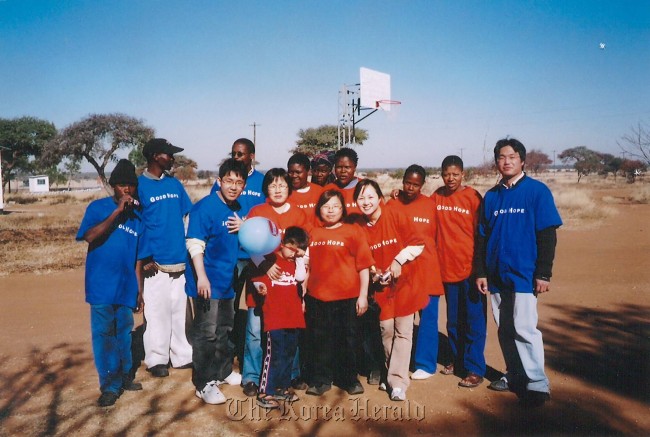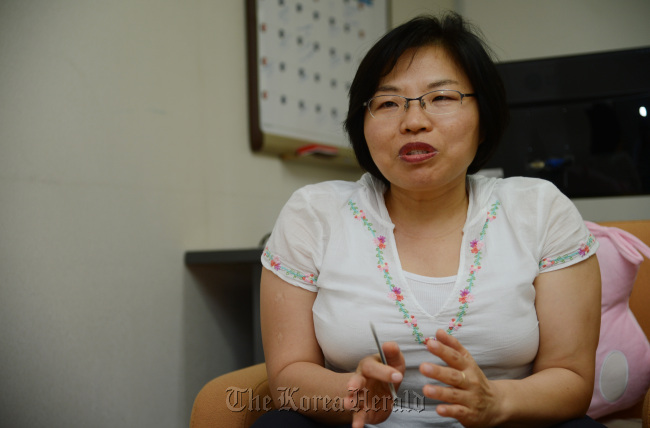Kim Hai-yung’s life used to be full of affliction, failures and discrimination. She was permanently disabled by her father’s violence, habitually abused by her mother and unwelcomed by schools, friends and society.
That was until 1990, when she went to southern Africa as a volunteer worker.
“When I first saw the children in poverty and despair as I used to be, I thought of what I could do for them,” Kim, 47, said.
She has devoted herself to education in the village at Good Hope, Botswana, for 14 years. She taught knitting at Stump Vocational Training Institute, commonly known as Good Hope School, which was founded with the help of a Korean Christian group.
That was until 1990, when she went to southern Africa as a volunteer worker.
“When I first saw the children in poverty and despair as I used to be, I thought of what I could do for them,” Kim, 47, said.
She has devoted herself to education in the village at Good Hope, Botswana, for 14 years. She taught knitting at Stump Vocational Training Institute, commonly known as Good Hope School, which was founded with the help of a Korean Christian group.


All 50 Koreans whom she had worked with left the school after four years, and she became the only Korean at the school which was on the brink of closure.
She was also preparing to go back to Korea. It was her students who changed her mind. They came to her and asked her to stay. She reopened the vocational school and became the president of the institution.
“I made up my mind to stay there for at least 10 years to achieve something. And it was educating people in a foreign nation, which is not an easy job. So I thought that it would not be too late to quit after 10 years,” she said.
The Korean government awarded her the Mogryeon Medal of Civil Merit for her dedication to Africa in July.
But Kim’s life was not always so bright.
She was not welcomed by her family when she was born in 1965. Her father, who was unhappy that his first child was a daughter, threw her to the floor, which injured her spine and left her with a permanent disability.
She is 134 centimeters tall, and her right leg is an inch shorter than the left, which makes her slightly lean toward the right when she stands and causes frequent backaches.
She was also abused verbally and physically by her mother, who suffered from depression. She began to take care of her four brothers and sisters at the age of nine. Her father lost his will to live, Kim said, and killed himself when she graduated from elementary school. She was unable to go to middle and high school.
Her mother’s abuse became more severe after the death of her father.
Her mother blamed Kim for everything from the family’s financial difficulties and the death of her husband, to her own mental illness. Kim had to stay out of the house for almost half a year because of this abuse.
However, despite this dark family background, Kim has kept a positive attitude.
“I realized at some point that all the guilt from my mom was illogical, irrational and unjust. Those things were not my fault. Then I decided two things: I will not hurt myself and I will try to live as if I will die today,” Kim said.
After that, she went on to sweep medals in knitting at the national skills competition for both people with disabilities in 1983 and the non-disabled in 1984, and won first place in the 1985 International Abilympics, or the skills Olympics for disabled people, in Bogota, Colombia.
She won the Order of Industrial Service Merit when she was 19.
While she was working, she passed tests for diplomas for secondary school.
Kim failed to get into university in Korea twice in her mid- 20s. She was discouraged and sick for a while, feeling a sense of failure. However, everything changed with a booklet that advertised for volunteers in Africa.
She did not hesitate. For her going to the African continent was like going to university.
One of her students named Magadi, then 17, especially liked her.
One day Kim was told Magadi had a stomachache and was taken to the hospital.
Kim, being single and in her late 20s, was shocked to hear the unmarried student had delivered a baby.
Magadi had already had her first child when she was 15.
Kim said she learned that people should not judge or blame others by religious or moral standards.
The mother of two died of a disease three months before her wedding at the age of 22.
Even though Kim has left Africa, she still makes time to return.
“I go to Botswana once or twice a year to meet the students I taught, who are in their 30s or 40s now, and their children,” Kim said, smiling.
After managing the school for 10 years, she needed some change.
“My life was stable. The school was run well. I think life that does not desperately seek something is unfortunate. That is why I went to the United States to study,” Kim said.
Kim studied social work at Nayak College in New York City. For her, studying was not difficult, and was more like completing a jigsaw puzzle. She already knew many things from firsthand experience. She graduated with a 3.8 grade point average.
There were also people who helped her.
An elderly couple who had long supported the Good Hope School helped her pay the tuition fees for the college. They are now her foster parents.
She also received a master’s degree in social work from Columbia University in New York.
“Doing my best for the work I do and the people I meet today is my top priority,” she said.
She is currently working as a manager of the Hope Project division at the Miral Welfare Foundation. The welfare organization is working on a project to build schools in Africa.
After the project is finished, she said, she is going to study social work further.
By Kim Young-won (wone0102@heraldcorp.com)


![[AtoZ into Korean mind] Humor in Korea: Navigating the line between what's funny and not](http://res.heraldm.com/phpwas/restmb_idxmake.php?idx=644&simg=/content/image/2024/04/22/20240422050642_0.jpg&u=)


![[Herald Interview] Why Toss invited hackers to penetrate its system](http://res.heraldm.com/phpwas/restmb_idxmake.php?idx=644&simg=/content/image/2024/04/22/20240422050569_0.jpg&u=20240422150649)
![[Graphic News] 77% of young Koreans still financially dependent](http://res.heraldm.com/phpwas/restmb_idxmake.php?idx=644&simg=/content/image/2024/04/22/20240422050762_0.gif&u=)




![[Exclusive] Korean military set to ban iPhones over 'security' concerns](http://res.heraldm.com/phpwas/restmb_idxmake.php?idx=644&simg=/content/image/2024/04/23/20240423050599_0.jpg&u=20240423171347)


![[Exclusive] Korean military to ban iPhones over security issues](http://res.heraldm.com/phpwas/restmb_idxmake.php?idx=652&simg=/content/image/2024/04/23/20240423050599_0.jpg&u=20240423171347)



![[Today’s K-pop] Ateez confirms US tour details](http://res.heraldm.com/phpwas/restmb_idxmake.php?idx=642&simg=/content/image/2024/04/23/20240423050700_0.jpg&u=)